|
|
|
Sort Order |
|
|
|
Items / Page
|
|
|
|
|
|
|
| Srl | Item |
| 1 |
ID:
146660
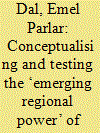

|
|
|
|
|
| Summary/Abstract |
Turkey has thus far been generally neglected in most IR studies on power categorisations, such as middle or middle-range power, regional power or rising/emerging power, despite its rising regional power status in the past decade. This paper attempts to understand Turkey’s regional power together with its rising power status using an integral approach. In doing so, it empirically tests whether or not Turkey fits Daniel Flemes’s ‘regional power’ category, which seems to be proposing a more complete and integral framework through the fulfilment of four basic preconditions: claim to leadership; possession of necessary power resources (material and ideational); employment of material, institutional and discursive foreign policy instruments; and acceptance of leadership by third parties. Based upon these analytical tools, the article will discuss Turkey’s performance in creating a regional impact in its neighbouring regions of the Middle East, the Balkans and the Black Sea and Caucasus.
|
|
|
|
|
|
|
|
|
|
|
|
|
|
|
|
| 2 |
ID:
146658


|
|
|
|
|
| Summary/Abstract |
This paper addresses the ambiguity of the term ‘sovereignty’ in food sovereignty (FS), intending to clarify the ‘aspirational sovereignty’ that food sovereignty movements indicate as the ideal configuration of power that would allow FS to flourish, or which might help measure movement towards FS. Since aspirational sovereignty is conditioned by existing power relations, the paper elaborates components of ‘actually existing sovereignty’, based on readings of a variety of political and social science literatures. By critically assessing the difference between actually existing and aspirational sovereignty across three geographic–political levels, the paper offers strategic options for constructing FS, and suggests what such an elaborated definition of FS’s sovereignty might offer future research on FS.
|
|
|
|
|
|
|
|
|
|
|
|
|
|
|
|
| 3 |
ID:
146655


|
|
|
|
|
| Summary/Abstract |
‘Managed migration’ schemes promote mobility of labour across international borders, diversifying worksites and introducing new systems of enacting labour consent. This article examines how Canadian franchisees are recruiting Filipino migrants to staff their restaurants, facilitating employers’ access to new, flexible subjects. These workers covet their employment as pathways to Canadian citizenship. Some are unaware, however, that they are recruited under a precarious immigration scheme, one that neither directly denies nor facilitates access to legal incorporation. Instead, migrants are (transnationally) encouraged to compete in the worksite for employer-nominated citizenship, a highly productive system for engendering consent. This draws attention to new challenges ‘managed migration’ schemes pose for resisting downward pressures on work and employment conditions.
|
|
|
|
|
|
|
|
|
|
|
|
|
|
|
|
| 4 |
ID:
146653
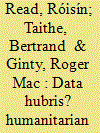

|
|
|
|
|
| Summary/Abstract |
This article looks at the promise of technology to revolutionise humanitarian action, especially in terms of the gathering and use of data. With many heralding a ‘data revolution’, the opportunities and enthusiasm for using social media and SMS data in crisis response are on the rise. The article constructs an analytical framework in order to scrutinise the three main claims made on behalf of technologically advanced humanitarian information systems: that they can access data more accurately, more quickly, and alter power relations in emancipatory ways. It does so in relation to two aspects of digital humanitarianism: visual technology and crisis mapping, and big data. The article is partly informed by a historical perspective, but also by interview and other material that suggests some of the claims made on behalf of technology are exaggerated. In particular, we argue that the enthusiasm for the data is vastly outstripped by the capacity to meaningfully analyse it. We conclude by scoping the implications of the future technological evolution of humanitarianism, in particular by examining how technology contributes to what Duffield terms ‘post-modern humanitarianism’.
|
|
|
|
|
|
|
|
|
|
|
|
|
|
|
|
| 5 |
ID:
146652


|
|
|
|
|
| Summary/Abstract |
In the aftermath of the Arab uprisings Foreign Terrorist Fighters (FTFs) have emerged as a significant security challenge. Since the 1980s and the Soviet occupation of Afghanistan the notion of a ‘foreign fighter’ has been closely linked, if not synonymous, with those ideologically or religiously motivated individuals who have travelled to join conflicts in Islamic lands. This article will explore the contemporary FTF movement, offering a comparison of Afghanistan in the 1980s and Syria in the contemporary period. It will explore the international community’s expansive responses to the challenge of FTFs, with special focus on the role of the United Nations.
|
|
|
|
|
|
|
|
|
|
|
|
|
|
|
|
| 6 |
ID:
146661
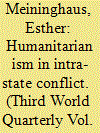

|
|
|
|
|
| Summary/Abstract |
This article argues that humanitarian aid in intra-state conflict plays a crucial but largely unrecognised role in shaping the preconditions for negotiations for peace and post-conflict reconstruction. Drawing on a spatial theory approach, it identifies the role of humanitarian aid as not being temporary and independent, but as forming an integral part of the daily lives of local communities and of continuously evolving structures of governance during conflict. As a result, significant imbalances in the distribution of aid between different geographical areas, as highlighted in the current Syrian war, threaten not only the immediate survival of civilians, but also their future.
|
|
|
|
|
|
|
|
|
|
|
|
|
|
|
|
| 7 |
ID:
146654


|
|
|
|
|
| Summary/Abstract |
This paper explores the notion of ‘innovation spaces’ within the UN system, as physical and virtual laboratories for innovation. Using empirical research in a range of innovation labs the authors explore four key questions: what form UN innovation labs have taken, what has motivated their creation, what their aims and objectives are, and what impact they are having. The answers to these questions promote reflection on the future of innovation spaces, particularly an analysis of whether a model of ‘siloed’ innovation spaces will survive in the humanitarian system. The paper demonstrates the important role that innovation labs play in the UN system, as well as grappling with the challenges they face.
|
|
|
|
|
|
|
|
|
|
|
|
|
|
|
|
| 8 |
ID:
146659
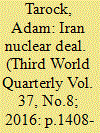

|
|
|
|
|
| Summary/Abstract |
Iran’s nuclear programme had for more than a decade become a controversial issue between Iran and the West; it had even threatened to develop into a military confrontation between Teheran and its arch adversary, Washington. The issue was finally resolved in an agreement, after more than a year of negotiations, between the two sides in Geneva in July 2015. This was hailed as a ‘breakthrough’ and a ‘win-win’ for both parties. It is argued here that the nuclear deal has made Iran’s nuclear programme almost inoperable, and pointed out that many members of Congress are vehemently against the deal; the next administration may not honour it or may revise it. The high costs of sanctions against Iran to the sanctioning countries are also examined, with a comparison made between the meagre concessions that Iran will get and the huge concessions that the West will receive under the deal. Furthermore, Iran has acceded to very intrusive inspection of some of its military sites. It is contended that, if the Iranians hope the agreement will soon bring about the resolution of other thorny regional and international issues that exist between Teheran and Washington, they are very likely to be disappointed.
|
|
|
|
|
|
|
|
|
|
|
|
|
|
|
|
| 9 |
ID:
146662


|
|
|
|
|
| Summary/Abstract |
What, if anything, is actually new about political and economic transformation in twenty-first century Latin America? Here we explore how ostensibly ‘new’ policies are being built on two ‘old’ foundations that may be mutually exclusive. These are ‘extractivism’ and ‘developmentalism’, concepts that have been used rather loosely to describe current economic policies. The new developmentalism, however, may not only be contradicted by extractivism; it may be more constrained than its predecessor by fortified capitalist class interests and new global conditions. Moreover, it pays little attention to the employment-generating potential of rural areas or to the agricultural sector.
|
|
|
|
|
|
|
|
|
|
|
|
|
|
|
|
| 10 |
ID:
146656
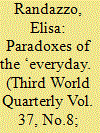

|
|
|
|
|
| Summary/Abstract |
With the advent of the local turn in the mid-2000s, critical approaches have attempted to rethink peace building from the bottom up, placing local agents at the centre of the debate, declaring the end of top-down governance and affirming the fragmented, complex and plural nature of the social milieu. While local turn approaches have become popular in peace-building theory, this article invites the reader to question and problematise the local turn’s use of the concept of ‘everyday’, in order to explore paradoxes and contradictions that indicate the need to think more deeply about the impact of the local turn’s project of critique.
|
|
|
|
|
|
|
|
|
|
|
|
|
|
|
|
| 11 |
ID:
146663


|
|
|
|
|
| Summary/Abstract |
This article presents and analyses the findings of a research project on power relations in the context of development partnerships with civil society on HIV/AIDS in Mozambique, Rwanda and South Africa, and engages in a critical dialogue with governmentality analysis. It argues that contemporary neoliberal government needs to be understood as context-specific articulations of three forms of power discussed by Foucault – sovereignty, discipline and biopower – and, in the global domain, a fourth form of power – (new) imperialism. Further, the analysis demonstrates how the introduction of a ‘package of (de-)responsibilisation’ shapes CSOs’ activities so that they become competitive service providers, use evidence-based methods and produce measurable results. Addressing the issue of resistance, it shows how the transfer of responsibilities may involve tension and struggle – a politics of responsibility.
|
|
|
|
|
|
|
|
|
|
|
|
|
|
|
|
|
|
|
|
|